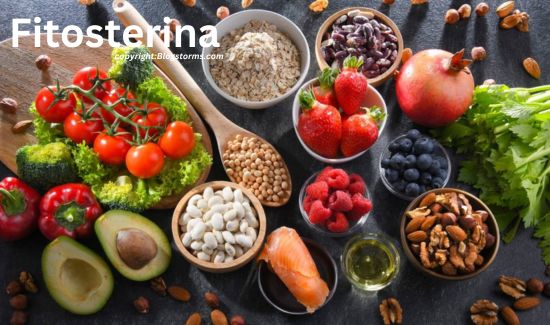Health Benefits Of Fitosterina
Fitosterina, derived from plants, offers a plethora of health benefits that can support overall wellbeing. One significant advantage is its ability to promote heart health by helping to lower cholesterol levels. By reducing the absorption of cholesterol in the gut, it contributes to maintaining a healthy cardiovascular system.
Additionally, it possesses anti-inflammatory properties that can assist in reducing inflammation throughout the body. This makes it beneficial for individuals dealing with conditions like arthritis or other inflammatory issues. Moreover, it has been linked to boosting immune function due to its antioxidant properties that help protect cells from damage caused by free radicals.
Furthermore, incorporating it into your diet may aid in weight management as it can potentially reduce fat absorption and increase satiety. Its potential role in supporting skin health and improving digestive function further emphasizes its versatility as a natural supplement for enhancing overall wellness.
Types of Fitosterina
When it comes to Fitosterina, there are different types that offer unique health benefits. One common type is beta-sitosterol, known for its potential in supporting heart health and managing cholesterol levels. Campesterol is another type found in various plant-based foods like nuts and seeds, offering antioxidant properties that can contribute to overall wellbeing.
Stigmasterol is a lesser-known but equally important type of Fitosterina that may help with inflammation and immune function support. Additionally, Brassicasterol is a type commonly found in cruciferous vegetables like broccoli and Brussels sprouts, known for its potential anti-inflammatory effects.
By incorporating a variety of these Fitosterina types into your diet through whole foods or supplements, you can enhance your wellness in diverse ways. Each type plays a role in nurturing your body’s natural functions and promoting holistic wellbeing.
Fitosterina in Diet and Nutrition
When it comes to incorporating it into your diet, the possibilities are endless. You can find this powerful plant compound in a variety of foods such as nuts, seeds, whole grains, fruits, and vegetables.
Including these natural sources of Fitosterina in your daily meals can help support overall health and wellbeing. By adding a diverse range of plant-based ingredients rich in Fitosterina to your diet, you can nourish your body with essential nutrients and antioxidants.
Whether you choose to sprinkle some chia seeds on your morning smoothie bowl or snack on almonds throughout the day, these small dietary changes can make a big difference in promoting wellness from within.
By focusing on whole foods that contain Fitosterina, you not only enhance the nutritional value of your meals but also contribute to a holistic approach towards maintaining good health.
Understanding the Science behind Fitosterina
Understanding the science behind Fitosterina delves into the fascinating realm of plant-based compounds and their impact on human health. Fitosterina, also known as plant sterols, are natural substances found in fruits, vegetables, nuts, and seeds that play a crucial role in supporting cardiovascular health.
Research has shown that Fitosterina can help lower LDL cholesterol levels by blocking its absorption in the intestines. This mechanism is key to reducing the risk of heart disease and improving overall well-being.
The interaction between Fitosterina and cholesterol metabolism highlights the intricate ways in which our bodies respond to dietary components. By incorporating more plant sterols into your diet through sources like avocado, whole grains, and soybeans, you can harness their potential benefits for optimal health.
Exploring the scientific foundations of Fitosterina underscores the importance of embracing a holistic approach to wellness that integrates nature’s potent healing powers.
The Top Plant-Based Ingredients in Fitosterina
Have you ever wondered about the powerful plant-based ingredients that make up Fitosterina? Let’s dive into some of the top players in this holistic blend.
First on the list is beta-sitosterol, a phytosterol found in various fruits, vegetables, nuts, and seeds. This compound has been studied for its potential to support heart health and cholesterol levels.
Next up is campesterol, another important phytosterol known for its anti-inflammatory properties. It can be commonly found in foods like avocados and olive oil.
Don’t forget about stigmasterol! This phytosterol plays a role in promoting skin health and may have antioxidant benefits as well.
Fitosterina in Everyday Life
Picture this: a bustling morning as you sip on your favorite herbal tea infused with the goodness of Fitosterina. Feeling energized and ready to tackle the day ahead, you head out for a refreshing jog in the park. As you breathe in the fresh air, you appreciate how Fitosterina supports your overall wellbeing.
Back home, you whip up a nutritious smoothie packed with plant-based ingredients rich in Fitosterina. The vibrant colors and flavors remind you that nourishing your body is more than just a routine – it’s a celebration of health. Throughout the day, whether at work or play, knowing that Fitosterina is by your side gives you an extra boost of confidence and vitality.
Incorporating Fitosterina into your daily life isn’t just about maintaining wellness; it’s about thriving in every moment. From skincare products to supplements, embracing the power of plants like never before elevates your self-care rituals. With it as your ally, each day becomes an opportunity to nurture yourself from within – naturally and holistically.
Potential Side Effects and Precautions to Consider
Plant-based supplements like Fitosterina are generally considered safe for most people. However, it’s essential to be aware of potential side effects and precautions before incorporating them into your routine. Some individuals may experience digestive issues such as bloating or gas when first starting with it. To minimize these effects, start with a lower dosage and gradually increase over time.
If you have underlying health conditions or are pregnant or nursing, it’s crucial to consult with a healthcare professional before using Fitosterina supplements. Additionally, if you are taking any medications, especially those that affect cholesterol levels or hormone regulation, speak to your doctor about possible interactions.
While rare, allergic reactions to plant compounds in Fitosterina can occur in sensitive individuals. If you experience any unexpected symptoms after taking Fitosterina, discontinue use immediately and seek medical advice. Remember that everyone’s body reacts differently to supplements, so listening to your body and monitoring how you feel is key when incorporating Fitosterina into your wellness routine.
Conclusion
Embracing a holistic approach to wellness with Fitosterina can be a transformative journey towards nurturing your wellbeing. By incorporating plant-based ingredients rich in Fitosterina into your diet and lifestyle, you can experience a myriad of health benefits that support your overall health and vitality.
From supporting heart health to promoting better immune function, it offers a natural way to enhance your wellbeing. Understanding the science behind this powerful compound empowers you to make informed choices for your health.
As you explore the types of Fitosterina and incorporate them into your daily routine, remember to prioritize balance and moderation. While enjoying the benefits of Fitosterina, it’s essential to be mindful of potential side effects and precautions to ensure safe consumption.








